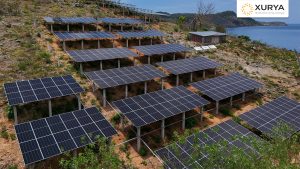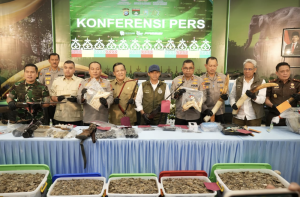Jakarta – The results of the Indonesia Cerah and MarkData survey show that electric vehicles (EV) subsidies are the most popular fair energy transition policy program. However, this program still needs to be more effective in reducing emissions and creating jobs.
Based on the stakeholder survey on equitable energy transition policies in Indonesia, 91.1 per cent of respondents considered electric vehicle subsidies the most popular equitable energy transition policy program. Meanwhile, the installation of solar power plants is only known by 67.5 per cent of respondents.
The survey was conducted by Indonesia Cerah and MarkData on December 10-20, 2023, in three regions, namely East Kalimantan, South Sumatra, and West Java, which greatly depend on fossil energy, especially coal.
The survey methodology used purposive sampling, involving respondents with certain criteria such as civil servants (ASN), private entrepreneurs and employees, workers and other civil society. A total of 123 respondents were involved in offline and online interviews.
Project Assistant Indonesia Cerah, Intan Fatma Dewi, said that respondents in South Sumatra considered electric vehicle subsidies the most effective program in the equitable energy transition because they save costs. Meanwhile, reducing air pollution (39.5 per cent) was the most effective reason cited by respondents in West Java.
However, she said that subsidising electric vehicles is still less effective in reducing emissions. This is because the number of electric vehicles in circulation is still relatively small. In addition, electric vehicles are still relatively expensive, making them unaffordable for everyone.
“Electric vehicle subsidies are ineffective enough to encourage an equitable energy transition. The government needs to review this program to make it more effective in reducing emissions and creating jobs,” Dewi said at the virtual ‘Launch of Survey Report and Discussion: Stakeholder Perceptions of Equitable Energy Transition Policies in East Kalimantan, South Sumatra, and West Java’ virtually.
She also said that 91.9 per cent of respondents were interested in supporting implementing a fair energy transition. Then, as many as 59.3 per cent of respondents considered that the energy transition program could change people’s perceptions of the government.
The CEO of MarkData, Faisal Arief Kamil, said that the majority of respondents, 87.0%, supported the implementation of a fair energy transition. The reason is that the majority of stakeholders have understood the importance of reducing negative impacts on the environment and climate change (72.0%) and see potential economic benefits such as the creation of new jobs (50.5%).”
However, he said, a few stakeholders also tend not to support a just energy transition, adding that 13 per cent of the respondents cited various reasons.
Some of the reasons include the perception that the benefits of the energy transition are not distributed equitably (71.4%), potential job losses in the oil, gas and coal energy sectors (57.1%), the presence of other issues or challenges that are considered more pressing (55.6%), and distrust in government and private sector commitments (42.9%).
When asked about opinions regarding the implementation of an equitable energy transition in Indonesia, respondents from East Kalimantan showed a higher level of concern (25%) compared to West Java (9.3%) and South Sumatra (5%).
“This indicates that there are different levels of concern in different provinces regarding the implementation of the equitable energy transition,” said Kamil.
The survey results provide an interesting snapshot of stakeholder views and support for an equitable energy transition in Indonesia, but also highlight the challenges and concerns that need to be addressed to successfully achieve this goal. (Hartatik)















